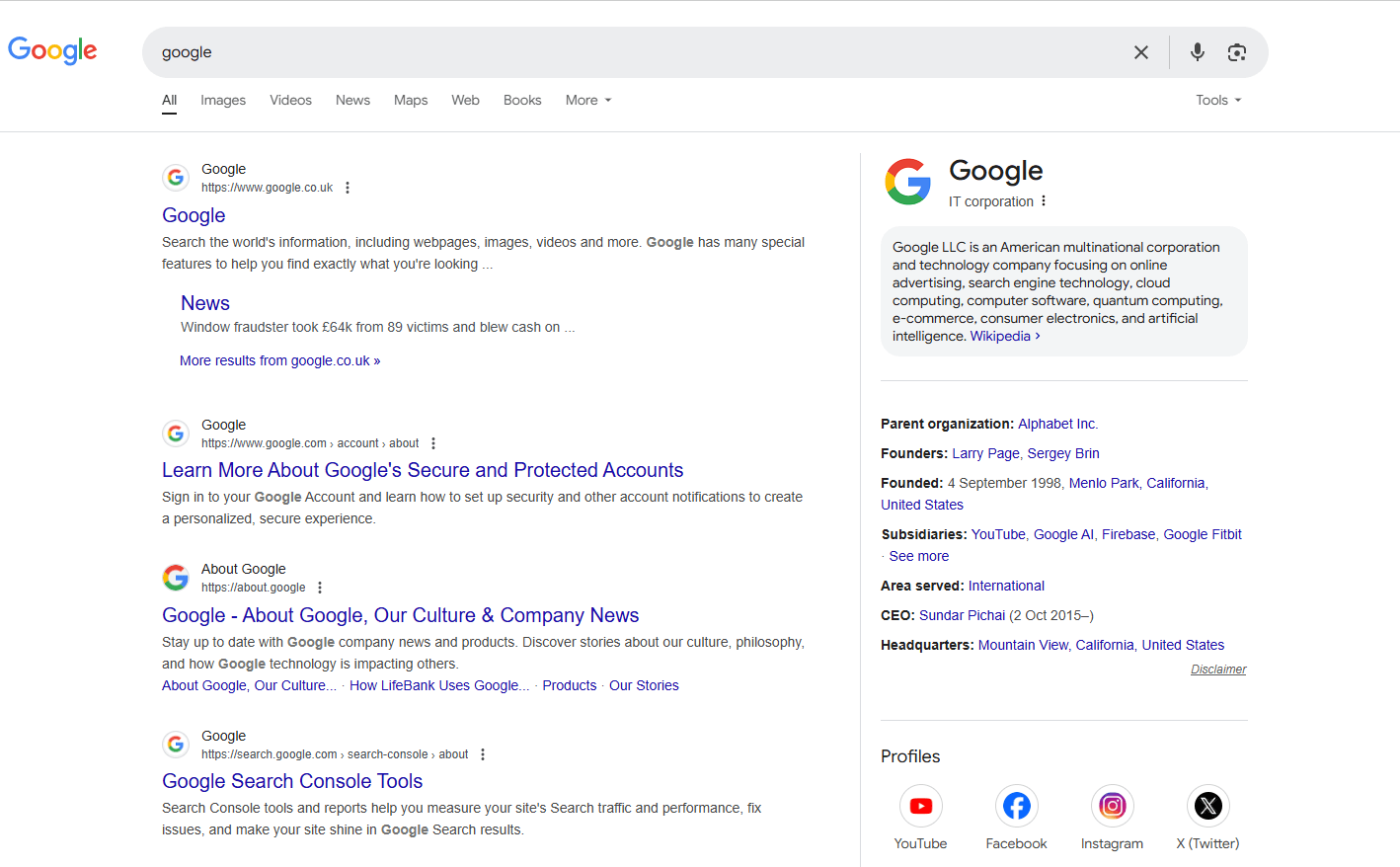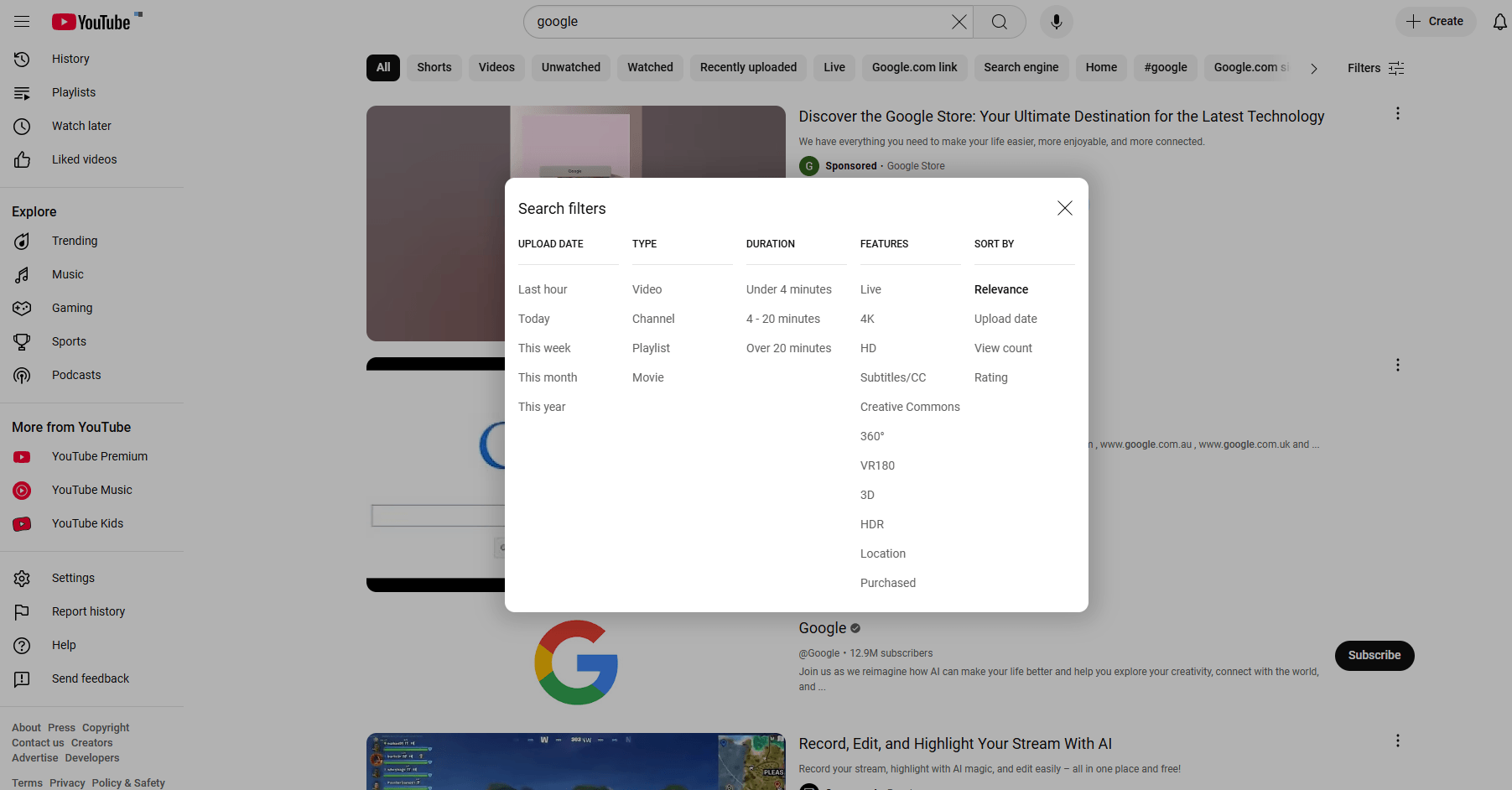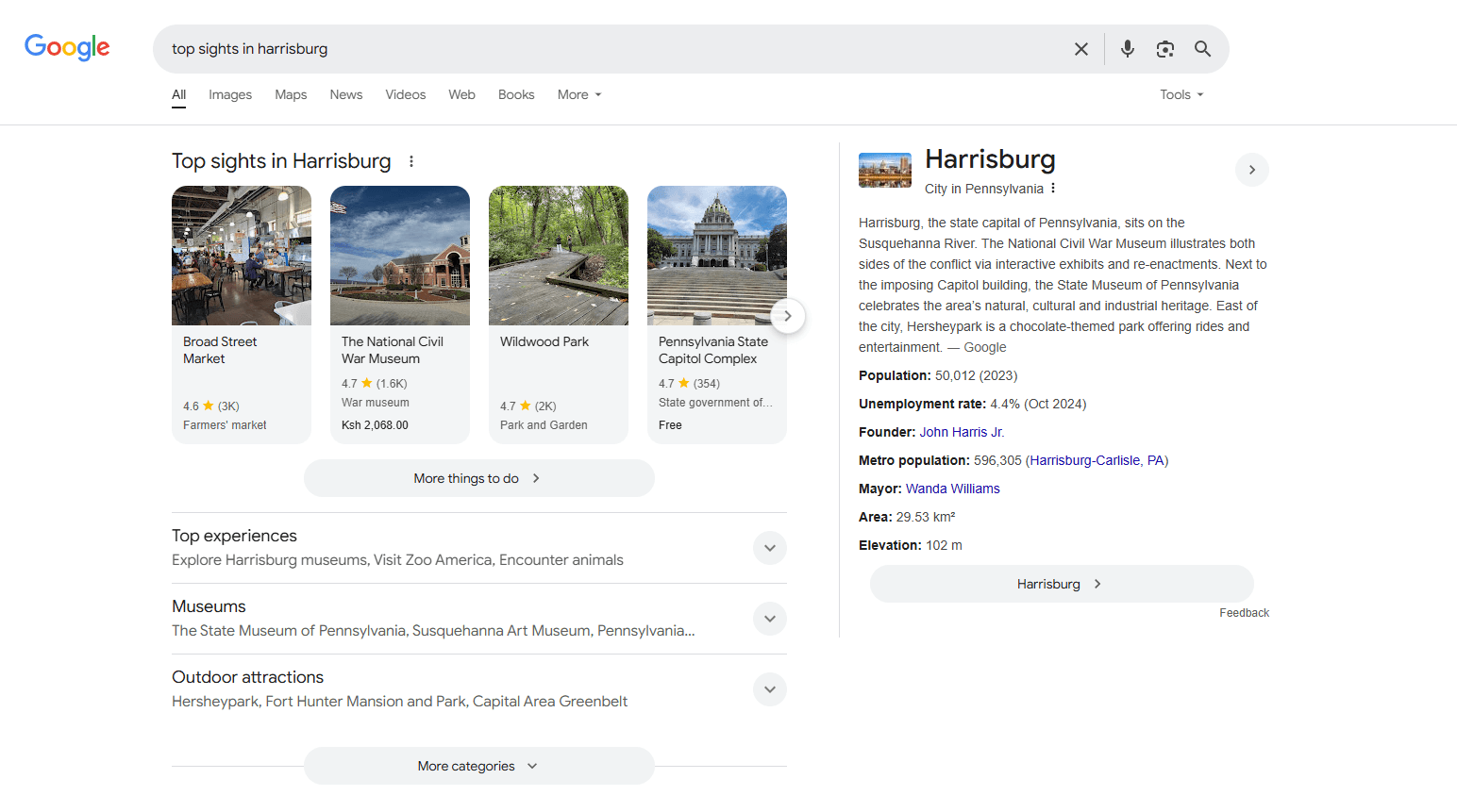- Home
- Blog
- Social Media Traditional vs. Social Search Engines: What Are The Differences?
Traditional vs. Social Search Engines: What Are The Differences?
-
 Published: Apr 3, 2025
Published: Apr 3, 2025
-
 10 min. read
10 min. read
-
 Lornah Ngugi
Lornah Ngugi Marketing Writer
Marketing Writer
- Lornah is a marketing writer with over six years of experience and a knack for writing unique and compelling content for a wide variety of topics in diverse industries. She has written over 400 posts for WebFX clients spanning tech, manufacturing, professional services, and other industries. She likes to start her days with a quiet outdoor walk in the park followed by a perfectly brewed cup of black coffee. There’s nothing a chocolate bar can’t fix for Lornah, from a bad mood to writer’s block.
Search engines have evolved significantly over the last decade. From the days of Archie — the first web search engine created by Alan Emtage in 1990 — to today, when Internet users are continuously using social media platforms as search tools.
For the past two decades, traditional search engines, like Google and Bing, have been the be-all and do-all for finding answers on the web. However, in the last decade, users — surprisingly both Millennials and GenZs — are embracing social media platforms, like LinkedIn and TikTok, to search and discover everyday information.
While social media search engines are not replacing traditional search engines, they’re gaining popularity fast because of the increasing adoption of smartphones for searching, the interactive nature of their results, and enhanced search functionalities.
Dive in to learn the main differences between traditional and social media search engines!
Overview of traditional search engines
Traditional search engines are software programs that facilitate Internet browsing. They pull results pages from various websites and pages on the Internet. They are the main gateway to web resources — without them, you’d have to rely on searching exact URLs or following hyperlinks on pages to discover new information.
Search engines follow a three-step process to find relevant results for users. These three steps include:
-
- Crawling: Web crawlers, also known as bots or spiders, crawl billions of publicly available web pages online. They use links to discover new pages, allowing search engines to provide users with the most up-to-date page versions.
- Indexing: Every search engine has an extensive database called a search index, to which they submit information like titles and text they read and process on a page. These indexes allow the search engines to provide users with accurate and contextual information.
- Ranking: The process that search engines use to select the pages they place on the search engine results pages (SERPs) and how they rank based on their relevance.
Examples of traditional search engines
There are many examples of traditional search engines that facilitate trillions of searches annually. However, here will highlight three notable ones with the biggest market share: Google, Bing, and Yandex, with global market shares of 89.74%, 3.97%, and 2.56%, respectively, as of December 2024.

Founded in 1998, Google is the most popular search engine worldwide. It processes approximately 8.5 billion searches daily. The secret behind Google’s success and consistent top ranking is the company’s ability to innovate and release search algorithm updates often.
It is generally more text-based but also shows images, map results, local business listings, and carousels at the top or the side of the results page. Google’s search feature ensures that users get accurate information at the right time and in the most appropriate format.
Bing

Bing is a search engine developed and managed by Microsoft with a more visual home search page than Google. It facilitates over 900 million searches daily, and users appreciate its simple-to-use interface, which includes many elements similar to Google, like SERP answer boxes and snapshots.
Bing’s algorithm favors webpages connected to social media accounts and ranks sites with a good user experience higher. Additionally, Bing comes with a Microsoft Reward program that awards users redeemable points whenever they search or shop on the engine.
Yandex
Yandex is the most popular search engine in Russia. It accounts for only 2.56% of the global market share but up to 74.43% of the Russian market share. One of the most impressive features of Yandex is that it provides quality indicators and badges along with search results.
Like Google, Yandex considers a search query’s local intent before displaying relevant results. Like social media search engines, this traditional search engine also considers user behavior when determining page rankings.
Overview of social media search engines
Social media search involves finding information using the search functionalities on social media platforms. Most social media platforms have a native search bar where users can find products and information based on specific:
- Usernames
- Mentions
- Trends
- Hashtags
- Location tags
- Products
These platforms have advanced filters that allow users to narrow their search to their interests or preferences. Most social media platforms can also suggest search terms based on trending or increasingly popular and engaging topics.
Examples of social media search engines
There are thousands of social media platforms with powerful search capabilities. The following are some of the most popular options.
YouTube

YouTube is the second-largest search engine in the world, with over 1 billion viewing hours daily worldwide. It’s considered a social media platform that provides free user-generated content that’s interactive and helpful to many.
YouTube provides searchers with video answers to educational and entertainment queries. It ranks content based on performance data, such as click-through rates and impressions or personalized relevance.
TikTok

TikTok is the fifth most-used social network globally, with over 2 billion active users. According to Adobe, more than two in five Americans and at least one in ten GenZs use TikTok as a search engine.
TikTok’s algorithm uses a recommendation system that makes it easier for users to stream videos relevant to their interests. It ranks videos based on user interactions, video information, and device and account settings.

LinkedIn is a professional networking platform with powerful search functionalities utilized by professionals. As a search engine, LinkedIn allows users to search for people, jobs, companies, and content related to their field of interest.
The algorithm refines searches based on relevant connections, location, industry, and experience level.
Key differences between traditional and social search engines
Up to 35% of millennials and 45% of GenZs prefer social media search engines over traditional search engines.
According to statistics, 35% of millennials and 45% of GenZs prefer social media over traditional search engines. This trend is driven by the increasing use of mobile devices to access the Internet.
While social media search engines are fast gaining popularity, traditional search engines are not going anywhere. Therefore, it’s essential to explore the main differences to help you choose which search engine works best for your business marketing.
| Difference | Traditional search engine | Social search engine |
| Personalization | Contextualized results based on location, search history, and search intent | Personalized results based on user’s history of interactions, preferences, and social cues |
| Relevance | Page authority and relevance | Based on social interactions in the platform |
| Accessibility | Accessible to all | Results can be limited to platform users |
| Result type | Text-heavy | User-generated visual content |
| Timeliness | Evergreen content | Viral content |
1. Personalization
Traditional search engines present users with relevant information based on location, search history, and search intent. On the contrary, social search engine result pages are highly personalized because they consider more metrics, such as recommendations, connections, comments, likes, shares, and other interactions.
Traditional search engines rely on an algorithm to rank pages based on location, keywords, and links, while social search engines rank relevant results based on recommendations from peers and influencers, social signals, and brand relevance.
Social media search engines learn from your interactions, preferences, and social cues to make your searches faster and more efficient.
2. Relevance
Traditional search engines prioritize page authority and relevance to index and rank pages. They determine relevance by analyzing keywords, content quality, and inbound links, amongst other factors.
Sometimes, they struggle to precisely match a user’s search intent, making you sift through many results before finding the most suitable one. Social search engines provide more accurate and relevant results by prioritizing personalized and real-time content over exact keyword matches.
Most social media platforms, like TikTok and Instagram, have a personalized feed with recommendations for brands, people, and products they’re interested in. The feed presents content based on your social interactions, connections, and pages you frequently interact with.
3. Accessibility
Traditional search engines have a user-friendly interface that makes them easy to use for people across different generations.
It also makes these search engines accessible to a global audience that is looking for a wide variety of answers in different formats. They’re optimized to load results in seconds while handling massive traffic.
Social media search engines are also pretty accessible, especially to people already familiar with the platforms.
Even better, you can find relevant answers on the first click and don’t need to open a different platform to access the answers, which is the case when you click on SERPs on search engines like Google, and they take you to different websites to access the information you’re searching for.
4. Type of results
Traditionally, search engines have been text-heavy, but they are gradually incorporating more visual and media results on SERPs. Some media content popping up on SERPs includes product images, videos, and maps, which offer a more comprehensive and engaging search experience.

Social media search engines provide a wide range of user-generated content from businesses, brands, and influencers.
These results are authentic and relatable because they represent real-life experiences and come in different formats, including:
- Short-form or long-form videos
- Images
- Carousels
- Text-based content
- Memes
- GIFs
Platforms like TikTok and YouTube focus primarily on video content filtered according to their duration, type, and content. The short video format and interactive and immersive search experience TikTok offers make it increasingly appealing for many searchers.
5. Real-time updates
One major downside of traditional search engines is that they don’t adjust results in real time based on user interactions like social media search engines. The latter provides results adjusted to account for real-time trends and viral content, ensuring you get the most up-to-date results.
Users can get real-time reviews on products and services by checking out the feedback left by former clients.
The downside is that older updates on social media are often buried below the newer ones, but traditional search engines favor evergreen content that remains relevant to users for many years, providing brands with long-term visibility.
Strengths and weaknesses of traditional vs social search engines
Both traditional and social search engines yield results, but they operate on different principles. Let’s explore the unique strengths and limitations of each type of search engine to help you understand their differences better.
| Category | Strengths | Limitations |
| Traditional search engine | Comprehensive, wide coverage | Generalized results |
| Active, real search intent | Static results | |
| Authoritative sources | SEO exploitation | |
| Social search engine | Personalized results | Limited scope |
| Real-time updates | Info overload | |
| Community engagement | Passive discovery |
Use cases: traditional vs. social search engines
Wondering where you should conduct your search? Here are the best use cases for each type of search engine.
Use a traditional search engine when…
– researching for a topic that needs reliable sources
– foundational, evergreen content
– looking for more options
Use a social search engine for…
– peer recommendations
– real-time updates
– viral trends
Trust WebFX to help you rank higher on the search engines that matter to your business
Understanding how the different types of search engines work can help you decide which one to use when establishing an online presence for your business. While social media search engines are the craze right now, optimizing your website for traditional search engines boosts your brand’s visibility, credibility, and authoritativeness.
WebFX is a full-service digital marketing agency that can handle all your needs, including search engine optimization (SEO), social media marketing, and more!
Our 500 will help you choose the right platforms for your business, which will help you connect with your target audience and maximize reach and returns. Call us at 888-601-5359 or contact us online today to discuss your search strategy!
-
 Lornah is a marketing writer with over six years of experience and a knack for writing unique and compelling content for a wide variety of topics in diverse industries. She has written over 400 posts for WebFX clients spanning tech, manufacturing, professional services, and other industries. She likes to start her days with a quiet outdoor walk in the park followed by a perfectly brewed cup of black coffee. There’s nothing a chocolate bar can’t fix for Lornah, from a bad mood to writer’s block.
Lornah is a marketing writer with over six years of experience and a knack for writing unique and compelling content for a wide variety of topics in diverse industries. She has written over 400 posts for WebFX clients spanning tech, manufacturing, professional services, and other industries. She likes to start her days with a quiet outdoor walk in the park followed by a perfectly brewed cup of black coffee. There’s nothing a chocolate bar can’t fix for Lornah, from a bad mood to writer’s block. -

WebFX is a full-service marketing agency with 1,100+ client reviews and a 4.9-star rating on Clutch! Find out how our expert team and revenue-accelerating tech can drive results for you! Learn more
Twitter and Facebook Status Generator
Finding engaging social media content for your business can be difficult. Use our tool to quickly find ideas and post directly to your page.
Give Me an Idea

Social Media Success Story

Proven Marketing Strategies
Twitter and Facebook Status Generator
Finding engaging social media content for your business can be difficult. Use our tool to quickly find ideas and post directly to your page.
Give Me an Idea





